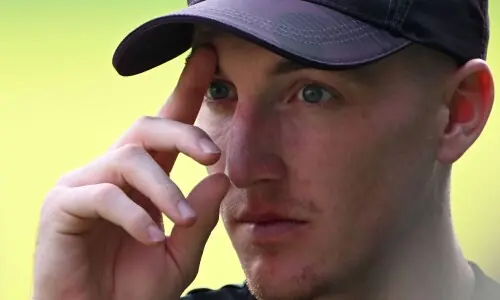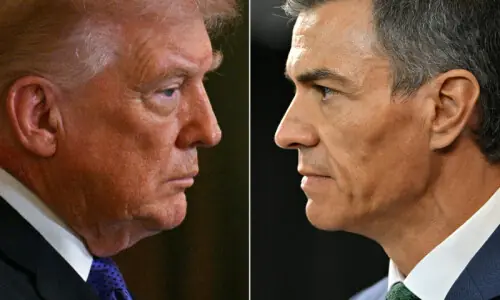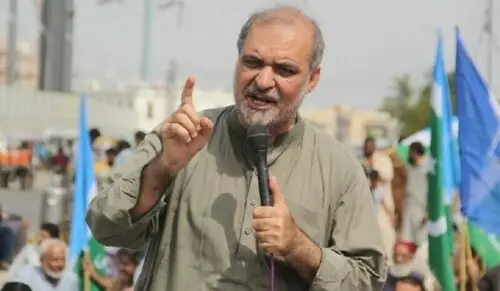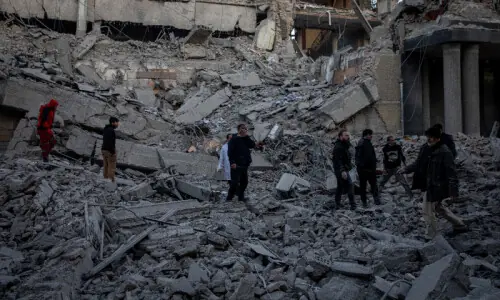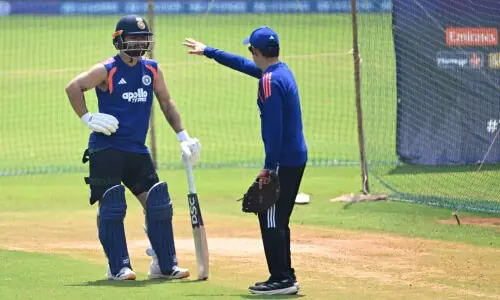THERE is hardly any organised effort to assess the causes of extremism. Certain questions need to be answered. What roles do discrimination and a class-based education system have to play in fanning extremism? What is the nexus between curriculum and extremism? How can communities — particularly women — counter extremism? How does social isolation incubate obscurantism?
Extremism not only fans terrorism but is also a reason for the multiplication of crime. Analysis of murder statistics from Jan 1, 2014 to April 15, 2014 suggests that out of a total of 783 murders in KP, 149 took place due to sudden provocation.
Radicalisation is a by-product of historical events, ideological conflicts and socio-economic and economic deprivation. The prevailing impression that terrorism and other forms of violent extremism can only be tackled by law-enforcement and security agencies is flawed. De-radicalisation requires equally the involvement of academics, researchers, sociologists, anthropologists, the media and clergy.
In the run-up to the 18th Amendment there were expectations that the status of Fata and the Frontier Crimes Regulation (FCR) would be resolved, but this proved to be an unfulfilled hope. Though the 1973 Constitution empowered around 37,000 maliks to vote, ordinary tribal people were kept away from the electoral process, which only served to alienate the common folk. It was only in 1997 that universal adult franchise was extended to the tribal areas.
De-radicalisation is a slow and laborious process.
Other factors that have spurred extremism in Fata and KP include the Afghan jihad; presence of Arabs in the tribal areas; and the values imported by labourers working in the Middle East. During 1973-1997 the maliks remained dominant; as a reaction to the maliks the clergy has emerged as a new challenge. In practice, the mullah and the malik have both maintained the status quo.
An obsolete, elite-centric criminal justice system has also incubated extremism. Before the military operations in Malakand and Fata began, locals were attracted by the alternative speedy justice system introduced by the extremists. The shura — imported from Arab culture — took root and challenged the FCR as well as the jirga. As part of an organised strategy militants attacked jirgas.
Extremism has also fanned cultural terrorism. Targeting the shrines of Sufi Sheikh Nisa Baba and Sheikh Bahadur Baba in Khyber Agency, Ziarat Kaka Sahib, Rehman Baba, Abdul Shakoor Malang Baba, Hazrat Abu Saeed Baba, Mian Umer Baba, Malang Baba and Ajmal Khattak was the outcome of a well-thought-out strategy. The tomb of Haji Sahib Tarangzai in Mohmand Agency was captured and converted into the headquarters of the militants.
Education has been another victim of extremism. The vice-chancellor of Islamia College University was kidnapped in 2010 and remained in captivity for four years. In 2009, militants attacked Malakand University while in 2010, Dr Farooq, the VC of Swat University and one of the inventors of the ‘Sabaoon’ component of the de-radicalisation programme, was killed by extremists.
Since 2006, there have been some 175 attacks on CD and barber shops in KP. Nishtar Hall, a cultural centre in Peshawar, remained closed for several years while cinemas were also attacked. Women singers Ghazala Javed and Ayman Udas were killed by relatives.
Extremism does not occur in isolation. Hence it is imperative to understand the contributory factors such as missing persons and internally displaced persons. The heirs of 739 missing persons and two million IDPs in KP are susceptible to extremism. Further, since 2004, in KP 4,045 persons have lost their lives in incidents of terrorism while as a result of 314 drone attacks in Fata, reportedly 2,774 people have been killed.
Jails are supposed to be correctional facilities but in our case jails are rearing criminals and extremists. There is a dire need to have de-radicalisation programmes in prisons. Lessons can be learnt from other countries’ programmes, such as the successful Jordanian de-radicalisation effort.
A de-radicalisation initiative focused on juveniles, adult prisoners and family members of detained persons in Swat was introduced in 2009. In Punjab, the Counter-Terrorism Department, with the collaboration of the Technical and Vocational Training Authority, initiated a pilot project to de-radicalise former extremists. More than 300 members of former banned organisations belonging to 15 districts of Punjab benefited from the programme. The pilot programme got financial allocation of Rs9.33 million. Former extremists between the ages of 16-35 were part of the programme.
Though the National Action Plan is a welcome step, it seems silent on de-radicalisation, reintegration and de-weaponisation. De-radicalisation is a slow and laborious process. It requires a collective and holistic approach. Remaining in a state of denial will be suicidal. It is therefore imperative for the state to not only use force, but to also counter militancy on the ideological front.
The writer is a police officer.
Twitter: @alibabakhel
Published in Dawn, August 25th, 2015
On a mobile phone? Get the Dawn Mobile App: Apple Store | Google Play













